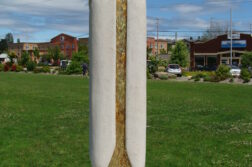More Antecedents to John Boswell
To the Editor:
As the survivor of an ex-gay Christian ministry, I read with great interest Brian Bromberger’s essay titled “John Boswell’s Religious Restoration” in the July-August 2016 issue. And while I resist Boswell’s sympathetic attitude toward the Catholic Church, I do agree with Bromberger’s assertion that “Boswell paved the way for other scholars to rediscover obscure, long-ignored texts and individuals that point to hitherto unacknowledged desires and relationships.”
However, I did find a key omission in an otherwise excellent survey of the scholarship on the topic of homosexuality and the Bible. Setting up his discussion, Brom-berger writes, “Prior to 1980, there really had had been only two favorable books written on the subject of homosexuality and Christianity.” He cites Derrick Sherwin Bailey’s Homosexuality and the Western Christian Tradition (1955) and John McNeill’s The Church and the Homosexual (1976), but he fails to mention Tom M. Horner’s Jonathan Loved David: Homosexuality in Biblical Times (1978).
Horner is not as academically dense as Bailey and McNeill, but his analysis is just as scholastically sound. Because Horner’s prose is more accessible to lay people, and because of the book’s relatively short length, I suspect Jonathan Loved David has exerted a wider influence on gay Christians than either Bailey or McNeill’s works, important as they are.
Anecdotally, as a young man losing my religion but finding my identity, Horner’s book gave me hope in the difficult transition from faith to atheism long before I discovered Boswell, Bailey, or McNeill in graduate school.
Frank Perez, Pres.
LGBT+ Archives Project of Louisiana
Lincoln Had a Lot of Company
To the Editor:
In response to Lewis Gannett’s piece, “Straight Abe: Back Like a Bad Penny” (Sept.-Oct. 2016), let me add this comment. No less than others, historians make mistakes, and an error does not necessarily discredit an entire body of work unless the error is so profound, so fundamental, that the author’s judgment in general must be called into question. Charles Strozier in his book Your Friend Forever appears to make such a fundamental error when he claims Lincoln could not have been gay because that would have made his success impossible. This claim is more than mere error. It is patent absurdity and argues the author either knows little gay history or willfully ignores it.
Given Strozier’s list of publications, the first possibility, that he knows little gay history, seems impossible. Why, then, has he chosen to ignore the long line of highly successful men who were involved in same-sex relationships that goes all the way back to Alexander the Great? If his claim is intended to refer only to American history, it still falls far short. In his piece, Gannett rightly mentions President James Buchanan, about whom there are even stronger grounds for inferring gayness than there are in Lincoln’s case.
Perhaps the most successful and essentially uncloseted gay man in our early history was the legendary Baron Wilhelm von Steuben, the man responsible for whipping Washington’s rag-tag mob of revolutionaries into a “modern” fighting force. Von Steuben was a fascinating and flamboyant figure whose appointment to the U.S. Army came just in time to allow him to escape arrest on charges of sodomy. There was no secret about this any more than there was about his preference for attractive, young aides, several of whom he brought with him to the Colonies. (Two of his aides were made his heirs.) It simply wasn’t openly talked about, especially after his military prowess proved so essential. Today he is one of the pantheon of Revolutionary War heroes. Towns and schools are named after him, but if there’s even one high school history text that mentions he was gay, I have yet to see it in 45 years as a history teacher.
In a similar vein, one thinks of the great Austrian general, Prince Eugene of Savoy, celebrated to this day as Austria’s greatest military hero—regardless of the considerable documentary evidence of people who knew him well that he was actively and openly homosexual from the time of his youth. Like von Steuben, he selected only attractive young men as his close aides (one of whom happens to have been an Irish ancestor of mine).
These three are but examples of “the love that dare not speak its name” hiding in plain sight. This was the case not only for men in high places, of course, but included many ordinary people. I have a charming photo taken in the 1930s of my great uncle Girard and his boyfriend “Foxy.” Their affection is evident in the photo and the true nature of their relationship was well known in the family. However, even after Griard’s tragic death long before I was born, it was never called by its right name. A raised eyebrow, a tightening of the lips, served to convey the message until the day my mother, a woman whose thoughtless indiscretion was legendary, let that cat out of its bag. Both Girard and his parents were long in their graves by then, so it mattered little, except to let me know I was far from the first gay person in the family.
Were Charles Strozier a student of mine, his text would have been returned with a red ink cautionary, written in the strongest terms, to be wary of making generalizations based on mere assumptions. This is not the correct historical method.
Tobias Grace
Editor Emeritus, Out in Jersey magazine
Clarification
To the Editor:
As a point of clarification—not a correction—to Lewis Gannett’s article on Lincoln [cited above], James Buchanan’s rumored lover and companion was U.S. Senator William Rufus deVane King (1786-1853) of Alabama, not the Federalist U.S. Senator Rufus King (1755-1827) of New York.
Theodore Brown, Jr., Knoxville, TN



